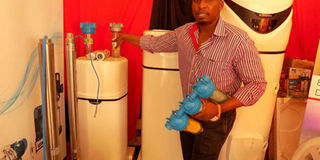Hot water from air? Yes, it’s possible

Mr Andrew Ngumba explaining how the heater works. PHOTO | LUKORITO JONES
What you need to know:
- The heat pumps combine various physical principles to work. Mr Ngumba explains that the pump operates by transferring heat from a source at a lower temperature (air) to a destination with higher temperature (water).
- This goes against the natural laws of physics, which say that heat is a form of energy that flows from an area with high temperatures to one with relatively lower temperatures.
Even though it is a primary chore carried out on a daily basis in our homes, heating water has for a long time been a major energy consumer, often driving electricity bills through the roof. As a result, many home owners avoid using electricity to heat water, with some opting to go the solar way.
However, solar heaters are unreliable because their functionality depends solely on the availability of sunlight.
What if someone told you that there was a way to get hot water out of thin air, literally?
Sounds far-fetched, right?
Well, actually it’s not. Output Solutions Ltd, a newly registered firm with branches in Nairobi and Mombasa, is advancing a technology that harness the heat in the air and uses it to heat water.
“For years now, Ariston Heat Pumps have been used across Europe for both domestic and commercial water heating. However, until our firm set up shop in Kenya two months ago, the technology was virtually unexploited in the country,” explains Mr Andrew Ngumba, a sales engineer and the company’s head of business development.
The heat pumps combine various physical principles to work. Mr Ngumba explains that the pump operates by transferring heat from a source at a lower temperature (air) to a destination with higher temperature (water).
This goes against the natural laws of physics, which say that heat is a form of energy that flows from an area with high temperatures to one with relatively lower temperatures.
The pump, which works in areas with atmospheric temperatures as low as -5°C, is aided by a refrigerant fluid. This fluid, according to Mr Ngumba, has unique properties that enable it to
withdraw heat from the air at low temperatures and pass it to the water inside the pump at a higher temperature. This, the engineer points out, is the reverse mechanism of the one used in
refrigerators.
HARMLESS FLUIDS
“Unlike other refrigerant fluids, which are known to contribute to global warming by depleting the ozone layer when released to the environment, the fluid used in our pumps is harmless to the ozone layer. It is not flammable and does not contain chlorine, making it nontoxic to both its users and the installers,” he explains.
A fan within the heat pump is used to suck in air from the surroundings. With the aid of the refrigerant, the air gives its heat inside the pump. A small amount of electricity is required to keep the fan running as it captures the air. Some electric current is also used to keep the refrigerant running through the system.
So even though the machine uses heat from the air to heat water, it still needs to be plugged into an electric socket in order to work.
“When heating water, less than 25 per cent of the total energy consumption comes from electrical energy. Our pumps use only 250 watts of electricity in an hour, which is equivalent to the energy consumed by five energy-efficient light bulbs. Other conventional water heaters use a minimum of 3,500 watts in one hour,” Mr Ngumba says.
Ariston heat pumps can also use solar energy and biogas.
The heaters come in different capacities, ranging from 80 to 250 litres. They can heat water to a maximum temperature of 70°C in 20 minutes when operating in areas with high temperatures such as the Coast. The time taken to heat the water stretches to a maximum of 1 hour and 45 minutes in cold regions.
“Our systems can be installed anywhere in the house, and they are remote controlled. They come with functionalities that enable them to purify water, making it safe and hygienic for human consumption. They are highly protected from corrosion, making them a long-lasting investment to institutions and home-owners,” Mr Ngumba says.
A self-confessed environmentalist, Mr Ngumba constantly advocates for homeowners to adopt green and renewable energy.




